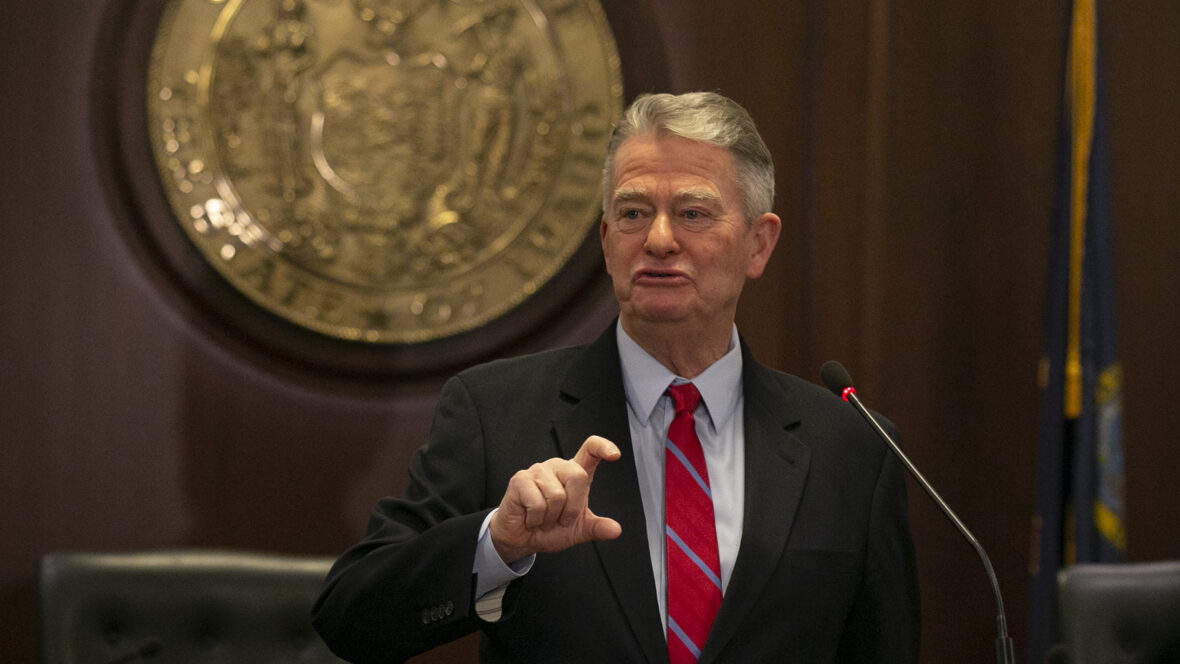
Gov. Brad Little said he expects the 2022 Legislature to approve all-day kindergarten.
“We’re going to work on early childhood, and kindergarten’s going to be a big part of it,” Little said Friday, during a legislative preview sponsored by the Idaho Press Club. “It will be addressed in some way, shape or form.”
Little’s own plans — for all-day kindergarten, or any other policy proposal — will come into sharper focus on Monday, when he kicks off the session by delivering his fourth State of the State address and spelling out his 2022-23 budget proposal.
But Friday’s 55-minute question-and-answer session with reporters offered a few hints about Little’s priorities.
Not surprisingly, all-day kindergarten appears to be high on Little’s list. He has long said that early childhood literacy is one of his top education priorities — something he restated at multiple points Friday. Little’s State Board of Education has already endorsed state-funded all-day kindergarten.
As it now stands, the state funds only half-day kindergarten. That leaves school districts to fund the second half of a full kindergarten day on their own — and many do, through student fees or tuition, or local property taxes.
It would cost about $40 million a year for the state to pick up the costs of full-day kindergarten.
Later Friday morning, two Senate leaders also said they were optimistic about the prospects for all-day kindergarten.
“I think there’s a good effort going on between the House and the Senate,” said Senate President Pro Tem Chuck Winder, R-Boise.
Lawmakers floated an all-day kindergarten bill last winter. The proposal never got a full committee hearing, but that doesn’t tell the whole story, Assistant Minority Leader Grant Burgoyne said.
“I think we were very close,” said Burgoyne, D-Boise. “I’m very optimistic.”
Proposals such as all-day kindergarten come as Little and the Legislature have a historic surplus on their hands, a projected $1.6 billion sum of money.
Little sent mixed signals on the surplus.
On the one hand, Little acknowledged that an infusion of one-time federal coronavirus aid has swelled the state coffers. But he also said the state’s growth is helping to drive the surplus. “There are not many orange flags on our radar screen.”
Little also said he was open to putting the surplus toward another round of tax cuts and education investments. But Little said he will send a cautious message Monday. “You’ll hear a lot about prudence.”
Other talking points from Friday’s Q&A.
Critical race theory/indoctrination. Little said education priorities remain unchanged: literacy, college- and career-readiness and reversing learning loss during the pandemic. He described Idaho’s new anti-indoctrination law — which Little signed last spring, with some reservations — as a “blocking maneuver” designed to address a national controversy. “But we do a lot of that in Idaho.”
The indoctrination debate has continued since spring, and will likely continue into the May GOP primary. Gubernatorial candidate and Lt. Gov. Janice McGeachin convened a summer task force to examine the issue. Kurt Liebich — a Little appointee who serves as State Board president — has said he has seen no evidence of indoctrination in the schools.
Burgoyne knocked the House’s reaction to alleged indoctrination as “placating the far-right,” but whether legislative leadership wants to take up more indoctrination-related legislation this year or not, they may not have a choice. McGeachin’s task force has pushed for an outright ban on teaching critical race theory in classrooms, and Little said Friday he wouldn’t be surprised if the issue comes back this session.
Federal education funding. With school districts sitting on hundreds of millions of dollars of unspent federal coronavirus aid, Little said the 2022 session could help break the logjam. Little said his education budget should leave school leaders “fairly pleased.” If the Legislature signs on, he said, local administrators could be more comfortable spending the feds’ money.
School staffing shortages. Little hinted at the need to further address school staff shortages — and local needs for substitute teachers, bus drivers or other employees. But since the needs vary from school to school, Little cautioned against a one-size-fits-all approach. “We’ll work with the superintendents and the trustees on whatever we can do to help.”
Legislative leaders eye the historic surplus
Winder and Burgoyne’s sunny forecasts for all-day kindergarten funding came in a subsequent Q&A, where they joined a pair of House leaders.
There, House Speaker Scott Bedke, R-Oakley, echoed Little’s push for literacy among K-3 students, and joined Winder, Burgoyne and Rep. James Ruchti, D-Pocatello, in floating increased education spending in 2022.
Bedke pointed to Idaho’s explosive population growth, warning that “it’s going to put some pressure on our infrastructure … including our school systems.”
Friday’s Q&A featured bipartisan suggestions that the state could funnel a portion of the budget surplus into public schools — suggestions that could be mirrored in Little’s Monday address.
But the idea of bankrolling education more through state money and less through local property taxes drew more split reactions.
Local school districts rely more on supplemental levies than ever, to the tune of $218.2 million this year, but attempts from both sides of the aisle to lower the perennially climbing bill have been controversial and, for years, ineffective.
Ruchti called on the state to take on more of the burden of funding education, allowing a reduction in local property taxes.
Idahoans pay those taxes “just to have the quality of schools that they can afford, not that they want, but that they can afford,” Ruchti said.
But Bedke observed that inequities in how districts are funded by levies “bog down” talks early, short-circuiting changes. He didn’t offer a reason to think that will change, though Sen. Jim Rice, R-Caldwell, has proposed a plan to phase out supplemental levies, as the Idaho Capital Sun reported.
A vast majority of the state’s 115 school districts regularly rely on supplemental levies to pay for anything from staffing and salaries to extracurricular programs and safety measures.
EdNews reporter Blake Jones contributed to this report.
